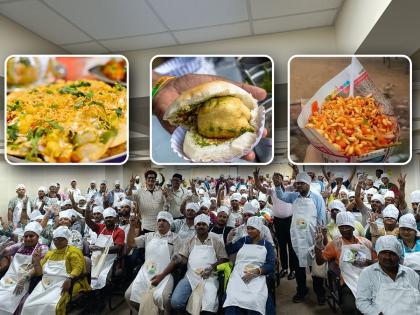Mumbai Street Food Gets Safer As FSSAI & BMC Trains Over 2000 Vendors Under 'Eat Right India' Mission
By Lokmat English Desk | Updated: June 17, 2025 19:01 IST2025-06-17T19:01:02+5:302025-06-17T19:01:09+5:30
To empower street food vendors around Mumbai, the Food Safety and Standards Authority of India (FSSAI) and the Brihanmumbai ...

Mumbai Street Food Gets Safer As FSSAI & BMC Trains Over 2000 Vendors Under 'Eat Right India' Mission
To empower street food vendors around Mumbai, the Food Safety and Standards Authority of India (FSSAI) and the Brihanmumbai Municipal Corporation (BMC) have started a ground-breaking food safety training program. This project, which is a part of the nationwide Eat Right India movement, attempts to improve hygienic standards and guarantee safe, excellent street food experiences in the city. More than 12 training sessions were held between January and June 2025, reaching almost 2,000 street food vendors in Greater Mumbai. These workshops promoted the broad adoption of food safety best practices in important street food hotspots, including Andheri, Borivali, Chandanwadi, Kandivali, Byculla, Girgaon Chowpatty, Khar, and Chembur.
This initiative supports FSSAI and BMC's strategic Memorandum of Understanding (MoU), which strengthens their shared dedication to improving food safety at the local level.
Also Read: Must-Watch Releases: Theatres & OTT Picks You Simply Can’t Miss This Week
More than 5,700 merchants have received training throughout Maharashtra, including important areas like Nagpur, Buldhana, and Thane, indicating the initiative's wide-ranging and expanding influence.
Important topics covered in the training modules include safe food handling, personal hygiene, contamination prevention, storage procedures, and appropriate waste disposal. These workshops, which are designed to satisfy national food safety regulations while tackling the real-world difficulties of street vending, give vendors useful information to enhance their business practices and boost customer confidence.
Positive vendor response and keen involvement have been noted by FSSAI and BMC officials. Numerous suppliers have reported that the training directly improved everyday operations and boosted customer confidence.
In the future, the initiative aims to train more than 10,000 street food vendors in Mumbai; further sessions are scheduled to guarantee thorough coverage. This program increases the grassroots execution of the FSSAI's national mandate, lowers public health risks, helps the economic sustainability of vendors, and solidifies Mumbai's standing as a model city for sanitary street food.
Open in app